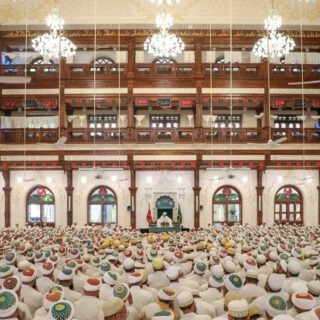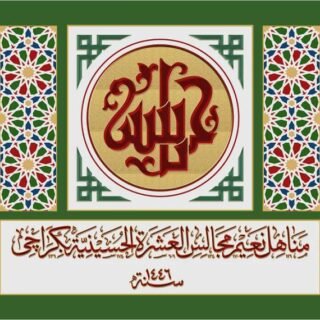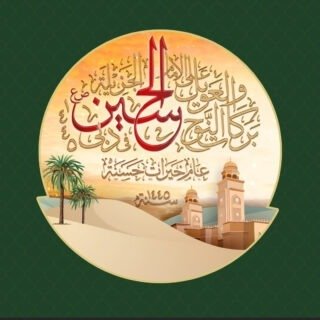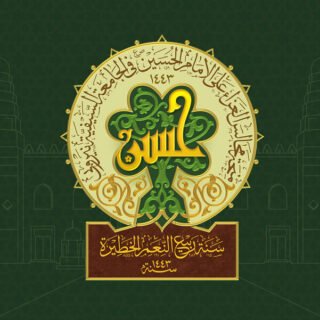The Academic Procession entered the Convocation Pandal escorted by the Riding Squad. Al-Dai al-Ajal Syedna Aali Qadr Mufaddal Saifuddin TUS walked ahead, with faculty members and students lined on both sides to catch a glimpse. Following suit were the Vice Chancellor, the University’s Executive Council and other faculty. Syedna TUS presided over the ceremony which included acceptance speeches, the presentation of degrees and the Convocation Address. Then Syedna, as Chancellor, addressed the gathering. Syedna’s speech in chaste Urdu, interwoven with verses from the Quran, and a profound interpretation of Surat al-´Alaq left the audience awed and inspired. One of the faculty commented that it seemed he were listening to a Sahaabi of Rasulullah SA. Another remarked that Syedna had given radiance to the convocation. Many of the faculty and students vied for a personal audience with Syedna.
The seal of the Aligarh Muslim University reads, “Allam al-Insaan ma Lam Y´alam” He taught man what he knew not (Quran 96:5).
During the 63rd Annual Convocation of the Aligarh Muslim University, Syedna Mufaddal Saifuddin TUS expounded upon the meanings entailed in this aayat, outlining the philosophy of education, not only for Muslims, but for humanity at large. Each of the 19 verses of the nazam composed by Syedna al-Dai al-Ajal TUS for the occasion ends with the chorus:
علم الانسان ما لم يعلم ايك اعزاز هسس
جس سسس ظاهر رفعة انسانية كا راز هسس
Surat al-´Alaq was the first surat of the Quran to descend upon Nabi Mohammed SA. Rasulullah SA often retreated to the cave of Hira. Jibraeel descended upon him and asked him to read, “iqraa’”. Rasulullah asked Jibraeel what he should read. Jibraeel replied, “iqraa’ bismi rabbik” Read by the name of your Lord. This was the inception of wahye, the inception of taleem: education.
The word ´allama in the ayat refers to the concept of taleem, that Allah taught man. Man does not know by himself: all knowledge comes from, is taught and facilitated by Allah and his Wali. The Quran is the source of all knowledge: spiritual and temporal. Worldly knowledge is only a part of what man has been taught: knowledge of the hereafter is of greater consequence. Allah’s Wali teaches man where he came from, what his purpose in life is, and to where he is to return.
Al-Insaan indicates that it is taleem that makes us human. It distinguishes us from other creatures. It develops the ‘´aql’ (intellect) that has been given only to man among all others.
Ma lam yalam alludes to the fact that when a human baby is born he knows nothing. It is striking that if a baby bird is put on the edge of a branch it will instinctively know not to fall off. A human baby in the same situation will not know any better. The purpose is that man must be taught by someone other than himself. Just as his parents and educators will teach him to survive in this world, Awliyaullah AS will teach him to prepare for the hereafter. An animal is born knowing all that it needs to know to survive in this world, as it is only created for this world. But a human being must ascend the rungs of education till he learns about this world and of the hereafter.
Wasjud waqtarib, the culmination of this surat is with the command to bow down to Allah Ta´ala in sajdah and thereby attain nearness to Him. This surat commences with the directive: read! It establishes that though Man reads, learns, discovers, innovates, and even reaches the stars, the end is not to lose sight of his purpose on this planet and become intoxicated by his achievements and intelligence, but it is to fall in sajdah for the Creator, for Allah and attain proximity to Him. For if this is not achieved then all of his intelligence and knowledge are void of all meaning, in fact they will be the cause of his ruin. In Rasaail Ikhwaan al-Safaa’, Imam Ahmed al-Mastur AS makes it clear:
“Know, my brother, that when any field of knowledge or literature does not guide its seeker towards pursuing the hereafter or aid him in reaching it, it will yield dreadful consequences for him and stand as an argument against him on the Day of Qiyaamat”.
The meaning of education elucidated through the ayat “Allam al-Insaan ma Lam Y´alam” by Syedna al-Dai al-Ajal TUS will be cherished by the Aligarh Muslim University and by the academic world for many years to come.








